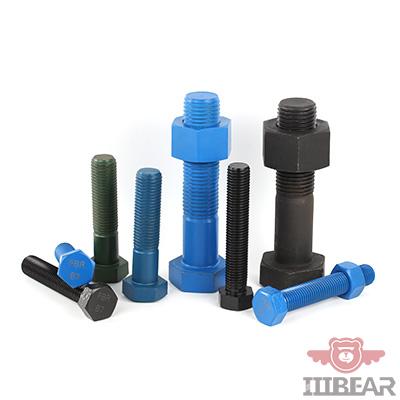Fasteners are critical components in construction, manufacturing, and countless other industries. However, their performance and longevity often depend on the type of coating applied. Fastener coatings are specialized treatments that protect against corrosion, reduce friction, and improve aesthetic appeal. In this guide, we’ll explore the basics of fastener coatings, their types, benefits, and how they are applied in real-world scenarios.

1. What Are Fastener Coatings?
Fastener coatings are surface treatments applied to bolts, screws, nuts, and other fasteners to enhance their properties. These coatings serve multiple purposes, including:
-
Corrosion Resistance: Protects fasteners from rust and degradation caused by moisture, chemicals, and environmental factors.
-
Friction Reduction: Improves the ease of installation and prevents galling (a form of wear caused by adhesive friction).
-
Aesthetic Appeal: Provides a uniform, attractive finish for visible fasteners.
-
Electrical Conductivity: Some coatings offer electrical insulation or conductivity, depending on the application.
Common coating materials include zinc, phosphate, ceramic, and polymer-based compounds. Each type offers unique benefits tailored to specific environments and requirements.
2. Types of Fastener Coatings
There are several types of fastener coatings, each suited for different applications. Here are the most widely used options:
-
Zinc Coatings:
Zinc is one of the most popular coatings due to its excellent corrosion resistance. Common methods include:-
Electroplating: A thin layer of zinc is applied using an electric current.
-
Hot-Dip Galvanizing: Fasteners are dipped in molten zinc, creating a thicker, more durable layer.
-
Zinc Flake Coatings: Provide superior corrosion resistance and are often used in automotive and aerospace industries.
-
-
Phosphate Coatings:
Phosphate coatings are applied through a chemical reaction, creating a porous layer that improves adhesion for paints and oils. They are commonly used in automotive and machinery applications. -
Ceramic Coatings:
These coatings offer high-temperature resistance and are ideal for fasteners used in engines, exhaust systems, and industrial ovens. -
Polymer Coatings:
Polymer-based coatings, such as nylon or epoxy, provide excellent corrosion resistance and electrical insulation. They are often used in electrical and marine applications.
3. Benefits of Fastener Coatings
Fastener coatings offer numerous advantages, making them indispensable in various industries. Key benefits include:
-
Enhanced Durability: Coatings protect fasteners from wear and tear, extending their lifespan.
-
Corrosion Protection: Prevents rust and degradation, even in harsh environments like marine or chemical industries.
-
Improved Performance: Reduces friction during installation, minimizing the risk of thread damage or galling.
-
Aesthetic Appeal: Provides a clean, professional finish for visible fasteners.
-
Customization: Coatings can be tailored to meet specific requirements, such as color coding or electrical properties.
4. Applications of Coated Fasteners
Coated fasteners are used in a wide range of industries and scenarios. Here are some notable examples:
-
Automotive Industry:
Fasteners with zinc or ceramic coatings are used in engines, chassis, and exhaust systems to withstand high temperatures and corrosive environments. -
Construction:
Hot-dip galvanized fasteners are commonly used in structural applications, such as bridges and steel frameworks, to ensure long-term durability. -
Marine and Offshore:
Fasteners with polymer or zinc flake coatings are ideal for boats, docks, and offshore platforms, where exposure to saltwater is a constant challenge. -
Electrical and Electronics:
Polymer-coated fasteners provide electrical insulation, making them suitable for circuit boards, enclosures, and other electronic components. -
Aerospace:
High-performance coatings, such as ceramic or specialized alloys, are used in aircraft assembly to meet stringent safety and durability standards.
5. Choosing the Right Coating for Your Application
Selecting the appropriate fastener coating depends on several factors:
-
Environment: Consider exposure to moisture, chemicals, temperature extremes, and UV radiation.
-
Load Requirements: High-stress applications may require thicker or more durable coatings.
-
Aesthetic Needs: For visible fasteners, choose coatings that offer a polished or color-matched finish.
-
Cost: Balance performance requirements with budget constraints.
For example, if you’re working on a marine project, a zinc flake or polymer coating would be ideal due to its superior corrosion resistance. On the other hand, for high-temperature applications, ceramic coatings are the best choice.
6. Installation and Maintenance Tips
To maximize the benefits of coated fasteners, follow these best practices:
-
Proper Handling: Avoid scratching or damaging the coating during installation.
-
Use Compatible Tools: Ensure tools are clean and free of debris to prevent coating damage.
-
Regular Inspections: Check for signs of wear or corrosion, especially in harsh environments.
-
Reapply Coatings if Necessary: For critical applications, consider reapplying coatings during maintenance to extend fastener life.
Conclusion
Fastener coatings play a vital role in enhancing the performance, durability, and appearance of fasteners. By understanding the different types of coatings, their benefits, and applications, you can make informed decisions that ensure the success of your projects.

